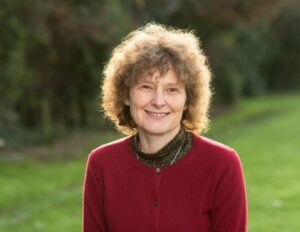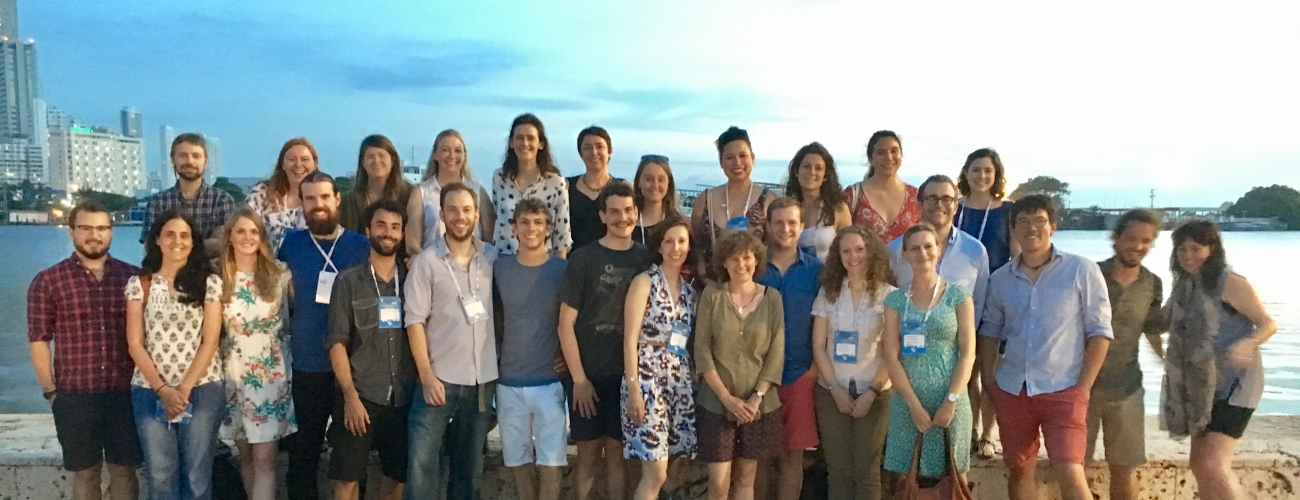University of Oxford
11a Mansfield Rd
OX1 3SZ
UK

E.J. Milner-Gulland
Background
E.J. Milner-Gulland is Tasso Leventis Professor of Biodiversity at the University of Oxford. Previously she was Professor of Conservation Science at Imperial College London, and she has also held lectureships in Resource Economics and Mathematical Ecology. Her PhD, at Imperial College London, was on the wildlife trade, with a focus on ivory, rhino horn and saiga antelopes. Her research group, the Interdisciplinary Centre for Conservation Science, undertakes a wide range of research, outreach and engagement projects, on five continents and in both marine and terrestrial settings. These include developing and applying methods for understanding, predicting, and influencing human behaviour in the context of local resource use in developing countries, and working with businesses to improve their environmental and social sustainability. Her team also works on controlling the illegal trade in wildlife and on designing, monitoring and evaluating conservation interventions in order to improve their effectiveness. She aims to ensure that all the research in her group is addressing issues identified by practitioners, and is carried out collaboratively with end-users, and builds the capacity of young conservationists, particularly in developing countries. She is the founder and chair of the Saiga Conservation Alliance and has launched a number of initiatives which aim to change the real-world conversation around conservation, including the Conservation Hierarchy approach to meeting a global vision of restoring nature and the Conservation Optimism movement. She is the Chair of the UK Government's Darwin Expert Committee and a Trustee of WWF-UK
Finally, I am passionate about the conservation ecology of the saiga antelope in Central Asia, and co-founded the Saiga Conservation Alliance in 2006.
Research Group

My research group is strongly interdisciplinary and has a wide range of research interests within conservation science. Our ethos is to ensure that all the research that we do is addressing issues identified by practitioners, and is carried out collaboratively with end-users.
My group’s research falls within three broad themes: understanding natural resource users; exploring social-ecological systems; managing human-nature interactions. The first theme addresses the drivers and motivations behind human behaviour towards the environment, the second theme addresses the feedbacks between individual behaviour and the wider social and ecological system within which they are embedded, and the third theme addresses how best to design, implement and evaluate interventions to alter human behaviour and hence slow the rate of biodiversity loss.
We work in both terrestrial and marine realms, and work closely with the practitioners who are implementing interventions, to ensure that they are designed, carried out and monitored in a way that leads to the desired outcomes from both conservation and social justice perspectives.
Additional Positions Currently Held
- Head of Department of Zoology, Oxford University (academic year 2021/22)
- Chair, UK government’s Darwin Expert Committee (2019 – )
- Founder and Chair of Trustees, Conservation Optimism (2016 -)
- Trustee, WWF-UK (Oct 2017 – ), Chair of Programme Committee (2019 – ) · Founder of ICCS Biodiversity Fellowships programme (Oct 2015 – )
- Founder and Chair of Trustees, Saiga Conservation Alliance (Sept 2006 – ).
- Leader of a research group of over 40 members (students, researchers, admin staff)
- Scientific Advisor, Synchronicity Earth (2018 – 2023)
- Oryx: the International Journal of Conservation: Senior Editor 1997- .
- Saiga News, Founder and Advisory Editor. June 2005-
- Technical advisor to the Convention on Migratory Species on the saiga antelope (2006- )
- Member, IUCN Species Survival Commission Antelope Specialist Group (1992- )
- Sustainable Use and Livelihoods Specialist Group (2004- )
- Greenlisting Task Force (2016).
Honours and Awards
· Sir Henry Savile Fellow, Merton College Oxford, 2021
· Society for Conservation Biology Distinguished Service Award, 2019
· Honorary Doctorate, Swedish University of Agricultural Sciences, 2018
· Honorary Doctorate, Hedmark University College, Norway, 2014
· British Ecological Society’s Marsh Award for Ecology, 2011
· Imperial College Rector’s Award for Excellence in Research Supervision, 2010
· Royal Society Wolfson Research Merit Award, 2008
· ZSL Marsh Award for outstanding contributions to conservation science, 2001
Research Grants (Current)
1. Oxford Martin School. Oxford Martin Programme on Biodiversity and Society. co-PI (£1,000,000), May 2021-April 2025.
2. East Alpha. Online tools to enable individuals and institutions to reduce their environmental impact. PI (£80,000). May 2021-April 2023.
3. Leventis foundation. The Leventis Biodiversity Fellows. PI (£152,725), July 2021-June 2026)
4. Private donor. Towards effective global wildlife trade policy. PI (£150,000), May 2020-April 2022.
5. German government (IKI). Transformative Pathways: Indigenous peoples and local communities leading and scaling up conservation and sustainable use of biodiversity. Partner organisation (led by Forest People’s Programme), initial phase (£39,000), March-October 2021.
6. John Fell Fund. Operationalising the Conservation Hierarchy in a complex setting. PI (£99,464), Oct 2019-Sept 2021.
7. GCRF Collaborative hub, TRADE (Trade, Development & Environment). co-I, WP leader (£1 million), April 2019-March 2024.
8. UK Darwin Initiative: Why eat wild meat? Developing effective alternatives to bushmeat consumption. Co-I, with IIED, Living Earth. (£365,826). July 2018-August 2021.
9. Oxford Martin School: The OMS programme in the illegal wildlife trade. PI, with Joss Wright. (£1 million), October 2016-September 2021.
Peer Reviewed Papers
Please see my ResearchGate page or Google Scholar for a full list.
Recent Media Interest in my Work
On the Darwin Initiative: BBC Radio 4 Today programme (5th June 2021).
On COVID-19 and the wildlife trade (selection): BBC Radio 4 “The Jump” (24/3/21).
BBC Radio 4 Food Programme (31st May 2020).
Globe and Mail (Canada), May 2020: https://www.theglobeandmail.com/canada/article-a-global-pandemic-casts-humanitys-relationship-to-nature-in-stark/
Speaker at All-Party Parliamentary Group on International Conservation’s hearing on wildlife trade, 4/6/20 https://www.youtube.com/watch?v=lskSHMD4wDw&feature=youtu.be.
Academic Armchair podcast: https://theacademicarmchair.libsyn.com/covid-19-and-animals-ft-professor-ej-milner-gulland
A global mitigation hierarchy for nature (May 2018): Bioscience podcast: https://www.stitcher.com/podcast/bioscience-aibs/bioscience-talks/e/54408314
Space for nature: 27th March 2018: Interview on the Today programme.
Ivory trade: 26th September 2017: Interview with John Simpson on the BBC Radio 4 today programme.
Conservation optimism (2017): http://www.dw.com/en/cheer-up-can-optimism-help-protect-the-environment/a-38586517, http://www.iflscience.com/environment/new-summit-announced-to-highlight-much-needed-optimism-in-conservation/, https://www.theguardian.com/environment/2017/apr/08/endangered-species-conservation-successes
Mass die-off of saiga antelopes in Kazakhstan (2015, 2018): Major coverage in online and print media (including a very highly cited article in The Conversation: https://theconversation.com/planet-earth-ii-why-more-than-200-000-saiga-antelopes-died-in-just-days-69859), TV and radio worldwide including National Geographic’s Years of Living Dangerously and BBC2’s Nature’s Weirdest Events (8th May 2017).
